|
|
|
Sort Order |
|
|
|
Items / Page
|
|
|
|
|
|
|
| Srl | Item |
| 1 |
ID:
114966
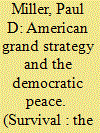

|
|
|
|
|
| Publication |
2012.
|
| Summary/Abstract |
It is commonplace to lament the United States' lack of a coherent grand strategy. Cold War historian John Lewis Gaddis argued in 2009 that the United States suffered from a 'grand strategic deficit' that went back two decades to the fall of the Soviet Union. Stephen Walt, a prominent International Relations professor at Harvard, blogged in 2010 that 'the United States tries to do more than it should, finds it much harder to set clear priorities, and tends to miss opportunities to "pass the buck" to others', the solution for which was 'a more lively public debate on fundamental issues of grand strategy'. Fareed Zakaria, then editor of Newsweek International, wrote in 2008 an article titled simply: 'Wanted: A New US Grand Strategy'.
|
|
|
|
|
|
|
|
|
|
|
|
|
|
|
|
| 2 |
ID:
114971
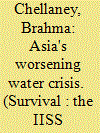

|
|
|
|
|
| Publication |
2012.
|
| Summary/Abstract |
Of all the natural resources on which the modern world depends, water is the most critical. There are replacements for oil, but there is no substitute for water. It is essential to produce virtually all the goods in the marketplace, from food to industrial products, as well as to produce electricity, to refine oil and gas, and to mine coal and uranium. Put simply, water scarcity and rapid economic advance cannot go hand in hand. Yet water scarcity now affects more than two-fifths of the people on Earth, and by 2025 two-thirds of the global population is likely to be living in water-scarce or water-stressed conditions. Water-scarce nations face very tough choices and serious socioeconomic consequences. And the majority of the world's people living in water-related despair will be in Asia.
|
|
|
|
|
|
|
|
|
|
|
|
|
|
|
|
| 3 |
ID:
114970
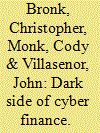

|
|
|
|
|
| Publication |
2012.
|
| Summary/Abstract |
Today information can be exchanged among billions of computers, mobile phones, tablets and other devices connected through the Internet or other networks, wirelessly or physically. There are robust online markets in virtual goods, sometimes paid for using virtual currencies. Computers across the globe can be used collectively to store information in a distributed way so that the information is, in a sense, both nowhere and everywhere at the same time. Encrypted data that convey or unlock value can move thousands of miles in milliseconds. All of this flexibility is being used to design new ways to move money.
|
|
|
|
|
|
|
|
|
|
|
|
|
|
|
|
| 4 |
ID:
114969
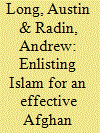

|
|
|
|
|
| Publication |
2012.
|
| Summary/Abstract |
An effective police force is central to providing security in general and is considered especially critical in counter-insurgency. The US Army's counter-insurgency doctrine embodied in Field Manual (FM) 3-24 notes that 'the primary frontline [counter-insurgent] force is often the police - not the military'. The strength and effectiveness of the police is important for waging counter-insurgency for two reasons. Firstly, the police can help directly in fighting the insurgents. In Afghanistan, police fight side by side with the military, and help provide security in many of the most dangerous areas. Secondly, building an effective and trustworthy police force is necessary for legitimising the existing government. When the police force fails to provide security (or worse, preys upon the population) the government is delegitimised. At the same time, the population's cooperation with the police is essential for effective policing. Police that are seen as outsiders simply cannot elicit the trust necessary to police a community. The importance of gaining the population's support also echoes the US military's 'population-centric' approach to counter-insurgency, as enumerated by former International Security Assistance Force (ISAF) commanders General Stanley McChrystal and General David Petraeus. Support from the population is essential to the police's role in fighting the insurgency since the population can, for example, provide the intelligence essential for identifying, locating and killing insurgents.
|
|
|
|
|
|
|
|
|
|
|
|
|
|
|
|
| 5 |
ID:
114968
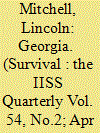

|
|
|
|
|
| Publication |
2012.
|
| Summary/Abstract |
Georgia is preparing itself for parliamentary elections in 2012 and a presidential contest in 2013. The country's Western allies see these elections as critical tests for Georgian democracy. This argument is comforting if for no other reason than its familiarity. But given the concentration of power in Georgian politics, and the limits on media, associational life and political activity in Georgia today, it is not likely that the next elections, without substantial changes to the political system, will move Georgian democracy forward. By looking at these elections entirely through the lens of democratic advance or retreat, the United States and Europe will be largely unprepared to see the other important impacts upon Georgian political development and the Georgian regime.
|
|
|
|
|
|
|
|
|
|
|
|
|
|
|
|
| 6 |
ID:
114963
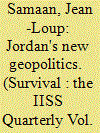

|
|
|
|
|
| Publication |
2012.
|
| Summary/Abstract |
With revolutions in Tunisia and Egypt, NATO's intervention against the Muammar Gadhafi regime in Libya and the unfolding civil war in Syria, the Kingdom of Jordan faces a dramatically altered strategic landscape. The kingdom has not been immune to the upheavals, having seen repeated protests since December 2010 on a scale not experienced for several decades.
|
|
|
|
|
|
|
|
|
|
|
|
|
|
|
|
| 7 |
ID:
114967


|
|
|
|
|
| Publication |
2012.
|
| Summary/Abstract |
If any nation seemed destined to succeed at painful post-war transitional justice, it was Serbia after the fall of Slobodan Milosevic. The country's seven million Serbs, even if they did not enjoy rule of law as they emerged from the brutal Balkan wars of the 1990s, did have established courts and other institutions that could be made to serve the interests of justice. They had a rambunctious civil society that deposed Milosevic (with the help of a mobilising election and the defection of some of his thugs) in 2000. In Zoran Djindjic they had a crusading prime minister who defied public opinion to extradite Milosevic to the International Criminal Tribunal for the Former Yugoslavia at The Hague in 2001. They had prosecutors willing to indict far more of their own ethnic group for war crimes committed in the 1990s Balkan wars than were neighbouring Croat, Bosniak (Bosnian Muslim) and Kosovar prosecutors. And the Serbs had the European Union next door to nurture and nudge their country toward democratic best practices on its way to eventual EU membership.
|
|
|
|
|
|
|
|
|
|
|
|
|
|
|
|
| 8 |
ID:
114965
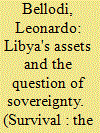

|
|
|
|
|
| Publication |
2012.
|
| Summary/Abstract |
In mid-February 2011, after popular revolts had overturned governments in Tunisia and Egypt, the so-called 'Arab Spring' reached the coasts of Libya. Protests against the decades-long rule of Colonel Muammar Gadhafi broke out in several Libyan cities and quickly gathered momentum, despite the efforts of the country's security forces to contain them. On 27 February, the leadership of the anti-Gadhafi movement, based in the eastern Libyan city of Benghazi, formed an interim National Transitional Council (NTC), which immediately declared itself the sole representative of the Libyan people. But although the uprisings in Tunisia and Egypt were quick and relatively bloodless, in Libya, the confrontation between Gadhafi's regime and the insurgents rapidly turned into an armed conflict.
|
|
|
|
|
|
|
|
|
|
|
|
|
|
|
|
| 9 |
ID:
114962
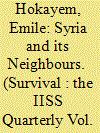

|
|
|
|
|
| Publication |
2012.
|
| Summary/Abstract |
Syria's neighbours have grown used to the resilience and surprising longevity of the Bashar al-Assad regime. Bashar owes much to the attainment by his father Hafez al-Assad of three strategic goals: consolidating internal authority, turning Syria's difficult geography (bordered by powerful or volatile states) into a source of regional relevance and turning its limited qualities of power into an appearance of strength. Today, with internal unrest and incipient civil war, this strategic stability is in jeopardy; the country is exposed to external predatory ambitions, sectarian-fuelled intervention and attempts to change its strategic orientation.
|
|
|
|
|
|
|
|
|
|
|
|
|
|
|
|
| 10 |
ID:
114964


|
|
|
|
|
| Publication |
2012.
|
| Summary/Abstract |
As Iran steadily develops the capacity to construct nuclear weapons, Washington and Ankara are increasingly on the same page, although key differences persist. Since the start of the Arab uprisings, Turkey and Iran have found themselves supporting different political factions in Syria and Bahrain. Turkey has retreated from its self-assigned role as Iran's diplomatic defender following a period of unusual warmth between Ankara and Tehran in 2009 and 2010. The current regional dynamics have pushed Ankara's immediate foreign-policy interests back into broad alignment with those of its traditional Western allies, notably Washington.
|
|
|
|
|
|
|
|
|
|
|
|
|
|
|
|
|
|
|
|
|